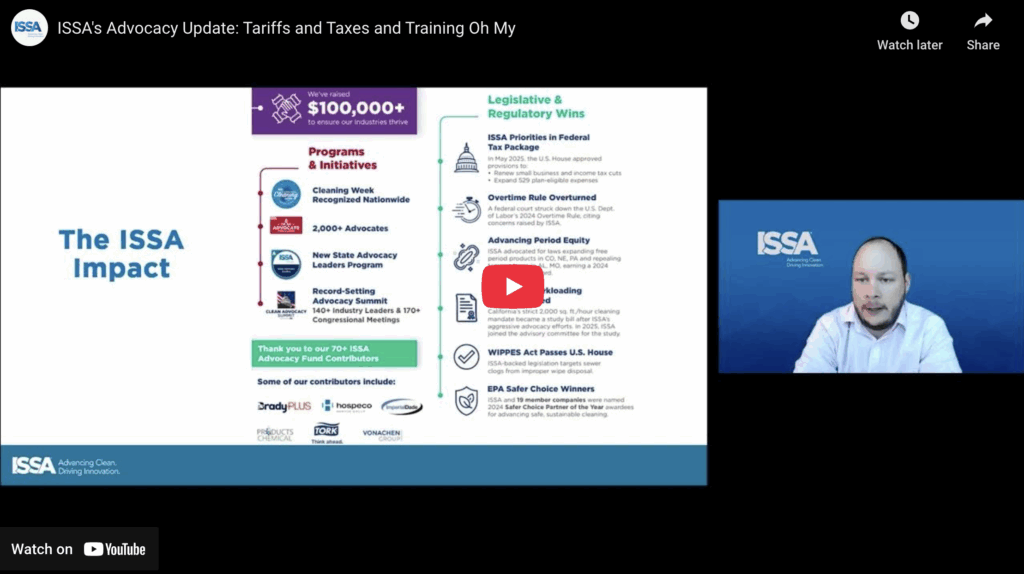From Tax Relief to Tariff Battles: ISSA’s Advocacy Agenda Unpacked
As global economic pressures and domestic policy shifts converge, the cleaning industry faces a critical juncture. At the heart of the response is John Nothdurft, ISSA’s Director of Government Affairs, who is helping shape how cleaning professionals navigate complex legislative terrain, on everything from tariffs and tax policy to workforce development and EPA regulations.
“We try to be your eyes and ears in D.C. and at state capitals,” Nothdurft said. “We know we can’t weigh in on everything, so we prioritize the issues that matter most to our members—those with the potential to either help or hurt your business.”
Advocacy by the numbers
ISSA’s recent impact report highlights how that advocacy translates into action. Over 2,000 cleaning professionals have joined the association’s “Advocates for Clean” initiative, taking part in town halls, responding to action alerts, and engaging in direct legislative outreach. Earlier this year, more than 140 industry leaders gathered in Washington for the Clean Advocacy Summit, meeting with over 170 congressional offices, the White House, the EPA, and the Department of Labor.
“The results speak for themselves,” Nothdurft said. “We secured small business tax cuts, helped expand 529 plan eligibility to include industry training, and advanced policies that make cleaning a respected, long-term career.”
Legislative wins with real-world impact
One of the biggest victories this year came with the inclusion of ISSA’s top three legislative priorities in a sweeping $3.3 trillion bill signed into law on July 4.
“It was probably one of the most heavily lobbied bills in history,” Nothdurft said. “We didn’t get everything we wanted, but from our standpoint, it was a major win.”
Key provisions include:
- Permanent extension of the Section 199A pass-through deduction, which allows many ISSA-member businesses to reinvest earnings.
- Expanded bonus depreciation for capital investments, letting companies deduct equipment purchases in a single year.
- Temporary tax reductions on tips and overtime pay, which could benefit frontline workers, especially in residential cleaning.
“We estimate this could translate into a $3,000 tax cut for tipped workers under certain conditions,” he added. “It’s still early, but the direction is promising.”
Workforce investment: beyond college degrees
Perhaps the most exciting development, according to Nothdurft, is the expansion of 529 plans to cover non-traditional education—including ISSA’s own certification programs. “This makes training in the cleaning industry not just an option, but a recognized investment in someone’s future,” he said.
ISSA is also in talks with the U.S. Department of Labor to establish the first government-recognized apprenticeship program specifically for cleaning industry workers.
“We want to build career paths,” he said. “Not just for entry-level positions, but also for supervisors and future leaders. And we’re exploring tax incentives and grants to help businesses make that happen.”
Tariffs: Prepare for lasting impact
Tariffs remain a volatile topic, but Nothdurft warned that the current administration appears committed to a baseline of 10–20% tariffs on most imports—regardless of ongoing trade negotiations.
“Tariffs have become a catch-all tool—whether it’s about trade imbalances, geopolitical friction, or even just diplomatic irritation,” he explained.
ISSA’s position? Support free trade wherever possible and push for exemptions on essential products like PPE, cleaning agents, and disinfectants.
“If you’re in manufacturing or distribution, you need to start budgeting with tariffs in mind,” he said. “This isn’t a blip. It’s becoming a fixture of trade policy.”
See our latest update: Tariffs and Taxes and Training Oh My
EPA gridlock and the push for smarter regulations
While some agencies are seeing budget cuts and reorganization, ISSA is focused on protecting access to critical cleaning products and streamlining regulatory bottlenecks.
“We’re in ongoing conversations with the EPA about the Office of Pesticide Programs, which regulates disinfectants,” Nothdurft said. “There’s talk of reallocating staff to speed up product approvals. If that happens, it could be a big win for innovation.”
He also expressed cautious optimism about the continued survival of the EPA’s Safer Choice program, which recognizes environmentally friendly cleaning products.
“It’s still alive and funded, which is a relief,” he said. “But we’re not taking it for granted.”
Immigration, compliance, and workforce realities
Labor remains a flashpoint, particularly as cleaning companies face I-9 audits and misclassification crackdowns, like the recent $2 million fine levied in California.
“That case should be a wake-up call,” Nothdurft said. “California has some of the strictest labor laws in the country. If you’re subcontracting or operating there, you need to be certain you comply.”
On the federal level, ISSA supports bipartisan legislation to create non-seasonal worker visa programs. “It’s about legal pathways to meet labor demand,” he said. “Our industry wants to do things the right way.”
State-level challenges: EPR and ergonomics
At the state level, ISSA is closely monitoring extended producer responsibility (EPR) bills, which shift recycling costs to manufacturers or distributors. The problem? Confusing and inconsistent language.
“Even where the law says it only applies to household products, some states define that to include industrial cleaners,” Nothdurft said. “It’s a regulatory minefield.”
In California, ISSA also successfully opposed a proposed janitorial workloading standard that would have capped productivity at 2,000 square feet per hour.
Looking ahead: Progress through persistence
For Nothdurft, ISSA’s advocacy work is about more than just policy. It’s about ensuring the cleaning industry is recognized—and respected—for the essential work it does.
“Lawmakers don’t always understand the complexity of our industry,” he said. “That’s why our members’ voices matter. Whether you’re inviting a legislator to tour your facility or sharing your story at the Advocacy Summit, it makes a real difference.”
And that difference is being noticed. From tax cuts to workforce investment, ISSA’s advocacy team continues to open doors—and keep them open—for the everyone that clean the world.
Learn more about ISSA Advocacy and get involved at issa.com/advocacyimpact. Do you have an advocacy story to share or a challenge to address? If so, contact John Nothdurft at [email protected] or Stacy Seiden, ISSA’s senior government affairs manager, at [email protected].















